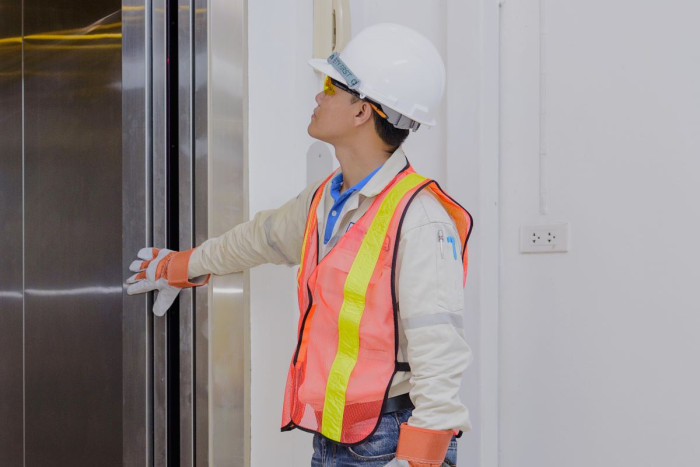Lift Technician
Kaihangarau Waka Kawe
Alternative titles for this job
Lift technicians install, maintain and repair lift and escalator systems.
Pay
Lift technicians usually earn
$55K-$75K per year
Senior or highly qualified lift technicians usually earn
$75K-$100K per year
Source: careers.govt.nz research, 2019.
Job opportunities
Pay
Pay for lift technicians varies depending on experience and responsibilities.
- Lift technicians with basic electrical or mechanical qualifications usually earn between $55,000 and $75,000 a year.
- Lift technicians in senior roles, or with advanced qualifications, can earn up to $100,000.
Source: careers.govt.nz research, 2019.
(This information is a guide only. Find out more about the sources of our pay information)
What you will do
Lift technicians may do some or all of the following:
- discuss requirements with clients
- install lifts and escalators
- modify circuitry in lifts and escalators
- monitor performance of lifts and escalators with a computer
- maintain lifts and escalators and fix faults
- free people who become trapped in lifts.
Skills and knowledge
Lift technicians need to have knowledge of:
- electronics and electrical theory
- mechanics and engineering
- lift mechanics
- building warrant of fitness requirements.
Working conditions
Lift technicians:
- usually work regular business hours, but sometimes do shift work, work weekends or are on call
- work in buildings, factories, private homes and on construction sites
- may work in confined spaces in lift shafts, and in potentially hazardous conditions at heights and around electrical controls and operational equipment.
Entry requirements
There are no specific requirements to become a lift technician.
However, employers may prefer you to be qualified as an electrician, engineer or mechanic.
ETCO oversees electrical apprenticeships and Competenz oversees engineering apprenticeships.
- ETCO website - electrical apprenticeships
- Competenz website - engineering apprenticeships
- More information about apprenticeships
Secondary education
No specific secondary education is required for this job, but NCEA Level 2 English, maths, physics and technology are useful.
For Year 11 to 13 learners, trades academies and the STAR and Gateway programmes are good ways to gain relevant experience and skills.
These programmes may help you gain an apprenticeship, but do not reduce the amount of time it takes to complete it.
Personal requirements
Lift technicians need to be:
- careful, responsible and safety-conscious
- accurate and precise in their repair and maintenance work
- patient, adaptable and practical
- organised, with good planning skills
- good at problem solving
- good with computers.
You don't need to know how every nut and bolt works, but you need to have a basic understanding of how a lift operates.
Scott McNab
Lift Technician
Useful experience
Useful experience for lift technicians includes:
- maintenance and diagnostics work
- electrical or electronics work
- mechanical work.
Physical requirements
Lift technicians need:
- to be reasonably fit and healthy, as they may do heavy lifting and stair climbing
- good hearing and eyesight (with or without corrective lenses)
- normal colour vision, as they work with colour-coded wires and semiconductor components
- to be comfortable working at heights and in confined spaces.
Find out more about training
- Competenz
- 0800 526 1800 - info@competenz.org.nz - www.competenz.org.nz
- ETCO
- 0800 275 3826 - www.etco.co.nz
What are the chances of getting a job?
The overall demand for lift technicians is average.
Lift technician is a small occupation but they are in high demand due to:
- a building boom in commercial buildings and apartments
- a shortage of people with the required skills and qualifications
- lack of specific training for lift technicians
- a general shortage of electricians.
Most lift technicians work in the major cities, where there are more high buildings with lifts.
If you are unqualified, the best way to get a job as a lift technician is to approach a lift company and say you are interested in being taken on as an apprentice.
According to the Census, 240 lift technicians worked in New Zealand in 2018.
International companies the biggest employers of lift technicians
Most lift technicians work for large international companies or for smaller local lift manufacturing and installation companies. Skifields also employ lift technicians.
About 15% of lift technicians are self-employed.
Sources
- BRANZ and Pacifecon, 'National Construction Pipeline Report 4', July 2016, (www.branz.co.nz).
- Ministry of Business, Innovation and Employment, '2006-2014 Occupation Data' (prepared for Careers New Zealand), 2015.
- Simpson, N, chief executive officer, Electrical Contractors Association of New Zealand (ECANZ), Careers New Zealand interview, March 2016.
- Stats NZ, '2018 Census Data', 2019.
(This information is a guide only. Find out more about the sources of our job opportunities information)
Progression and specialisations
Lift technicians may move into lift consultancy, subcontracting work or other electrical-based occupations.
Last updated 9 December 2024


